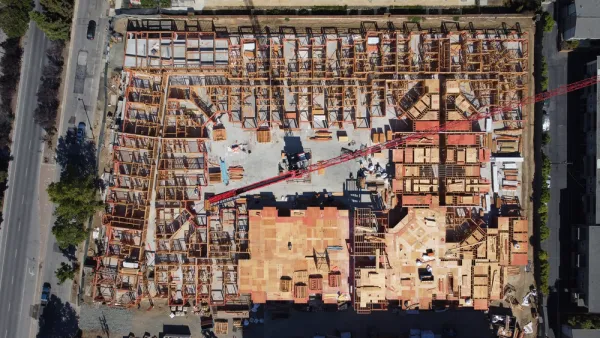Voters in the Colorado town of Boulder will consider a city charter amendment that would assign land use regulation power to 66 neighborhood-level voting districts.
Kriston Capps reports on a looming vote in Boulder, which he describes in no uncertain terms as "mega-NIMBYism at work."
In effect, the proposed charter amendment, before voters as issue #300, would give the power to change and enforce land use regulations to neighborhood-scale votes. Here's how Capps summarizes the current development approval process compared to the ballot box zoning program that would be enacted by the ordinance:
"At present, when the city council approves a zoning change, it triggers a 30-day cooling-off period during which voters can take action. If 10 percent of Boulder’s voting population sign a petition against a zoning change, then the council is required to reconsider it. The ordinance can be put up for a direct referendum. Through its elected representatives and oversight process, the city decides zoning changes for itself.
But if the proposed charter amendment passes, then the locus of the action will shift from the city to the neighborhood. The amendment serves to define 66 residential neighborhoods and invest them with petition authority. So when the council passes a zoning change that affects Chautauqua, it will only require 10 percent of the voters living in Chautauqua to successfully move a petition. And when a petition is successful and if the ordinance is put up for a vote, only voters living in Chautauqua may weigh in on the measure."
Capps also notes that another, complementary measure up for consideration in November—ballot issue #301. Development Shall Pay Its Own Way, as #301 it is also called, "would require the city to reject any new development that does not 'fully pay for or otherwise provide additional facilities and services to fully offset the additional burdens imposed by the new development.'"
Capps devotes much of the remainder of the article's word count to lambasting the consequences should voters approve the two measures. In effect, according to Capps, the city would be voting to approve a large dome to be placed over the city.
For some local commentary on the vote, Jessica Yates, a local attorney, penned an op-ed questions whether the laws would be considered constitutional under state law.
FULL STORY: 'They Are Coming for Our Neighborhoods'

Analysis: Cybertruck Fatality Rate Far Exceeds That of Ford Pinto
The Tesla Cybertruck was recalled seven times last year.

National Parks Layoffs Will Cause Communities to Lose Billions
Thousands of essential park workers were laid off this week, just before the busy spring break season.

Retro-silient?: America’s First “Eco-burb,” The Woodlands Turns 50
A master-planned community north of Houston offers lessons on green infrastructure and resilient design, but falls short of its founder’s lofty affordability and walkability goals.

Test News Post 1
This is a summary

Analysis: Cybertruck Fatality Rate Far Exceeds That of Ford Pinto
The Tesla Cybertruck was recalled seven times last year.

Test News Headline 46
Test for the image on the front page.
Urban Design for Planners 1: Software Tools
This six-course series explores essential urban design concepts using open source software and equips planners with the tools they need to participate fully in the urban design process.
Planning for Universal Design
Learn the tools for implementing Universal Design in planning regulations.
EMC Planning Group, Inc.
Planetizen
Planetizen
Mpact (formerly Rail~Volution)
Great Falls Development Authority, Inc.
HUDs Office of Policy Development and Research
NYU Wagner Graduate School of Public Service




























